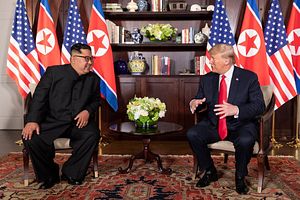At first glance U.S. President Donald Trump and North Korean leader Kim Jong Un seem like an unlikely pair. A few years back they were calling each other “Rocket Man” and a “dotard,” and tension between the United States and North Korea was escalating rapidly in 2017. But in a few days they are slated to meet for the second time, and according to Trump they had “fallen in love” not long after their first encounter. What could have created such intimate bond between the two? The common interest that brings the two together is the desire for development — economic development in the case of Kim and property development in the case of Trump.
Even before Kim Jong Un came to power, North Korea pursued the so called “byungjin” policy: the parallel pursuit of nuclear and economic development. Nuclear development was a legacy bestowed upon Kim by his forefathers and was an obligation he had to achieve to secure respect as the new leader. Kim could have settled with having nuclear weapons capability in 2017 and could have simply blamed the United States and economic sanctions for crippling North Korea’s economy. But Kim didn’t settle. He was willing to improve relations with the U.S. and move forward with economic development, and even discuss denuclearization in that process. Not everyone in North Korea would have been happy. Kim is taking substantial political risk by pursuing his economic development agenda.
The other key to the mutual bond is the developer-turned-president, Donald Trump. North Korea has ample development opportunities and Trump most likely senses the potential. Two things are critical for development projects to succeed — financing and cash flow. The wealth nearby in China, Japan, South Korea, and the United States renders North Korea an attractive location for development. Large investments from nearby countries could flow into North Korea if the conditions are right. Moreover, the higher income neighbors could infuse sustainable cash flow to North Korea’s development projects. Trump’s showing of a short film on North Korea’s potential for property development during their first summit meeting was truly an unusual diplomatic pitch. But it attests to Trump’s DNA as a developer.
Trump and Kim share a common desire for development. It is unlikely that the leaders of the United States and North Korea will have this type of bond in the future. Improved U.S.-North Korea relations have the opportunity to offer better economic prospects to the 25 million North Koreans and peace to many more in the surrounding area. If given sufficient breathing room to work out the details, Secretary of State Mike Pompeo, U.S. Special Representative for North Korea Stephen Biegun, and their team may find common ground with the North Koreans and work through a concrete plan when they return from Hanoi. The unexpected chemistry between Trump and Kim has created a unique opportunity.
Yong Suk Lee is the Deputy Director of the Korea Program and an economist at the Freeman Spogli Institute for International Studies at Stanford University.

































